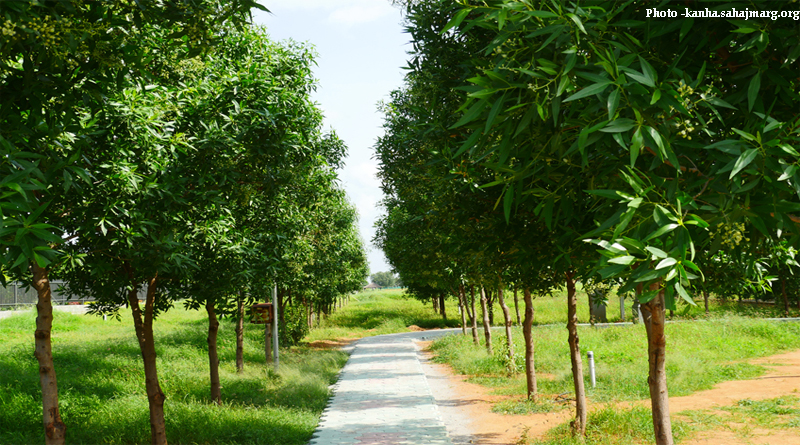A Translocation Success Story. Kanha Shanti Vanam

Kanha Shanti Vanam is an integrated township established 60Km away from Hyderabad. True to the Sahaj Marg Yoga system followed at the township, the township is giving trees a new lease of life as a part of its translocation program. The success achieved here with translocation of trees is particularly heartening, as translocation has still not really caught up in India as a way to save perfectly healthy trees that are making way for the wave of new infrastructure coming up. Government bodies , judiciary and even locals have frequently taken cover behind compensatory plantation drives, where the results have been mixed, at best, with survival rates as low as 10% in some cases. Translocation on the other hand starts off with a healthy plant that has already achieved a level of growth, and done right, is a more powerful way to preserve and sustain.
Back to Kanha Shanti vanam, this once rocky barren land, where locals claim to have not received rainfall for over 120 years is now a sprawling green landscape, with trees spread over 250 acres and harvesting ponds being full to the extent of them overflowing.
The peripheral roads on the eastern and southern sides of the ashram are designed to grow trees acquired through translocation. Trees, which are commissioned to be cut down are instead uprooted and sent to Kanha where they are replanted, thereby giving them a second chance at life. These trees are on an average 10-15 years old and grow back to their full size in 3-4 years (after being replanted).
In a recent project of the translocation drive, Kamlesh Patel also known as Daaji, the chief guide of the Kanha Shanta Vanam and the fourth spiritual guide of the Sahaj Marg System replanted 60 coconut trees from the Karur district of Tamil Nadu. The trees as per a news report were cleared to make way for a housing project.
The drive has saved at least a 1000 trees since its inception. These include 15 Banyan trees, some of which are 150 years old; 20 Peepal trees, which are 20-30 years old and 300 avenue trees including Pongamia & Bauhinia with a lot them being 8 years old.
Speaking to Iamrenew, Daaji said ” Trees are essential for our life on this planet. Their role and usefulness are beyond measure, and often beyond our understanding. Apart from the obvious gifts – life-giving oxygen, food, shelter and medicines – trees also retain spiritual charge better than most human beings, thus preserving a beautiful atmosphere in the environment and helping us to maintain balance at a subtle, inner level. Trees are good for our overall well-being, and it is our duty to protect existing trees from being destroyed whenever possible. One tree saved is equivalent to hundreds of trees being planted.
One-and-a-half years back, when we heard of the plans to fell established trees to make way for road widening, we stepped in quickly to save these trees by transplanting them to Kanha Shantivanam. Since then, we have saved more than 1,000 trees from destruction. Even in this, the trees continued to shower their generosity on us: just recently we were in need of avenue trees and a batch of 120 coconut trees, which were being removed from Karur, served our purpose, saving us many years of waiting for the trees to grow. They are truly a gift to mankind.
Kanha Shanti Vanam’s “Green Kanha” motto is truly befitting. The replantation of trees has led to a rise in the groundwater levels in Kanha.
Besides the translocation project. Kanha has an in-house nursery spread over 5 acres, with over 20,000sq. ft. of green net shaded area. The nursery housed 125,000 saplings at the beginning of 2017 and has a total capacity of 2 lakh saplings. The community is also involved in organic farming where several varieties of vegetables are grown by the volunteers.
Kanha also set up its own waste water treatment plant. This environmentally friendly and zero power consumption system known as Constructed Wetlands is used for treating both black and grey waters. The treatment of water is done by Phytoremediation, Bioremediation and Rhizoremediation.
At Kanha Shanti Vanam, the waste is segregated into plastics and food. The food waste is then collected and dumped into a pit. The pit is sprayed with microbial solutions and filled with dried leaves prior to putting the waste in, once the food is dumped, it is sprayed with the solutions again and covered with mud. It is important to spray microbial solutions as untreated solid waste tends to form leachate, which essentially poisons the surrounding land as well as the groundwater. The landfill is left covered for 40-50 days after which the decomposed material is used as manure.
Kanha Shanti Vanam, is currently still being constructed. The ashram is designed to facilitate an extensive spiritual and personal experience When fully constructed Kanha will be able to host spiritual gatherings of over 50,000 people. With thousands of mature trees from day 1, one wishes the mindset behind it spreads and saves even a fraction of the countless trees being felled for ‘development’.
Links: Kanha Shanti Vanam; Daaji; Sahaj Marg





One thought on “A Translocation Success Story. Kanha Shanti Vanam”